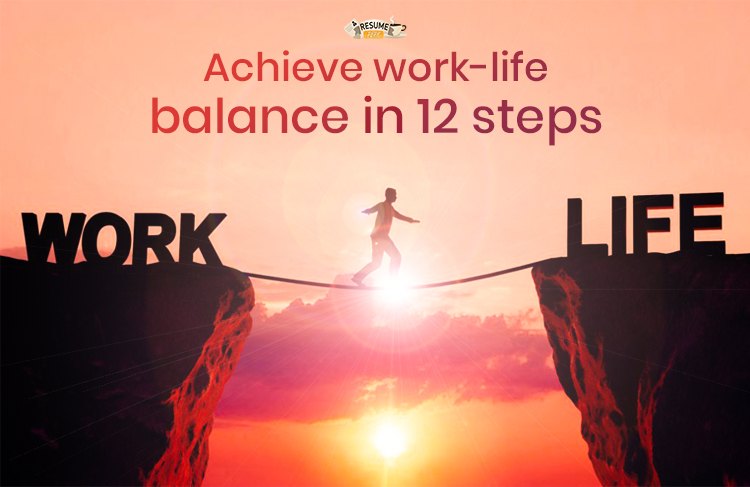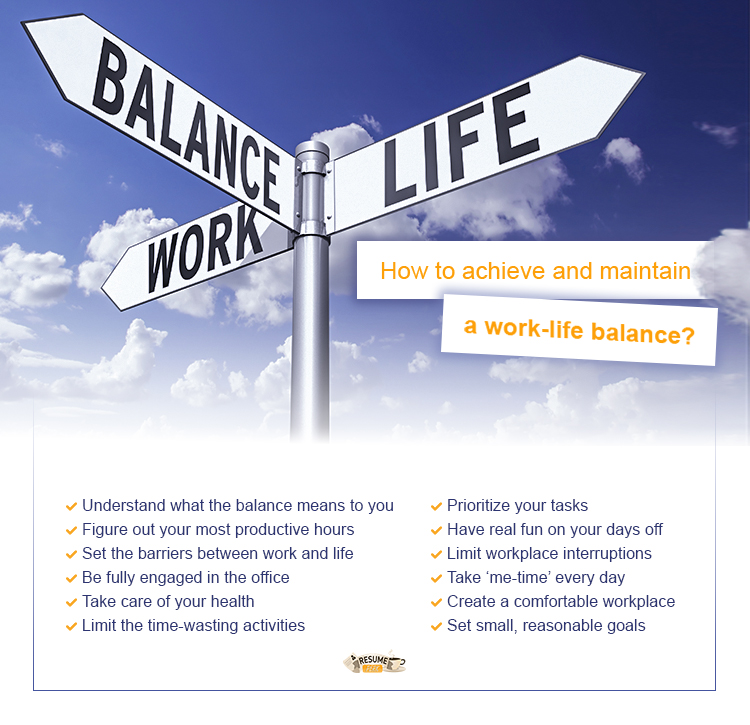Achieve Better Work-Life Balance in 12 Steps

A healthy work-life balance sounds fantastic in the modern world. According to Harvard Business School, 94% of employees work more than 50 hours a week. Due to technology, people consider it normal to be always available for late night calls and emails. The lines between work and time off blur, leading to cumulative stress, lack of quality rest and damaged relationships.
In fact, due to constant stress and burnout, you might even feel that you hate your job, even though you’ve always loved it. So, if you feel that you work non-stop and barely manage to relax and spend time with your loved ones, chances are that you simply need to improve your work-life balance. Our resume writers NYC have prepared a list of step-by-step actions for achieving that fragile work-life balance. Try following it and see what happens.
Feeling stuck with your current job and would like to find employment that would allow more flexibility? A professional writer of Resumeperk.com can help you land more interviews. Our expert will correct the mistakes and shortcomings in your resume and improve the format. By focusing on your strengths and achievements, the writer will help you look like a top candidate and maximize your interview chances.
Why is a healthy work-life balance important?
You might not think about it this way, but quality rest is a fuel that helps you keep going in your career. When you are exhausted, sleep-deprived and overtired it’s hard to look at your professional responsibilities creatively, come up with new initiatives and be positive around customers. To maintain high productivity, it’s absolutely essential that you relax and unwind. Let alone the fact that working extra hours simultaneously isn’t good for your health and close relationships. If you don’t know where to get started optimizing your life, check out our advice below.
12 steps towards a work-life balance
Step 1. Understand what balance means for you
Work-life balance isn’t necessarily about working 8 hours per day. If you work for a rapidly growing company or in the industry where overworking is normal, this would be unrealistic. However, be clear about what kind of balance you are trying to achieve. Maybe, your goal is leaving work at 7pm every day to have dinner with your family. Or, your dream balance might be not showing up at work in your days off. Or maybe, your form of balance is being able to do your job without getting overwhelmed by minor distractions and secondary tasks. The definition of work-life balance is individual for everyone. Decide on yours before you move any further.

Step 2. Figure out when you are most productive
Genuine work-life balance doesn’t just assume working less – it means making the most out of your time to achieve better productivity and more time for yourself. To achieve this, you need to understand the hours and conditions of your peak productivity. Probably, you are the most productive early in the morning or in hours after work when your colleagues have already left the office building. Allocate this time for the most important tasks that require deep concentration. If possible, ask the boss to reconsider your working hours. Today, many companies allow more flexibility if it guarantees getting work done.
Step 3. Set the barriers between work and life
If you decide to follow only one piece of advice from the list, then choose this one. Leave work at work and don’t be proud of being constantly accessible as it isn’t a good thing for your work-life balance. Define a set of rules that you will be following to maintain the balance and communicate them to people you work with. For example, you do not check work emails after 9pm and switch off your phone at all on Sundays. You need to be out of reach in certain hours of the day - and not only because interruptions don’t let you spend quality time with a close friend or family. When you are always available to discuss work issues, you don’t actually switch off from work and your brain doesn’t get quality rest. Needless to say that it’s a surefire way to chronic stress, professional burnout and other unpleasant conditions.
Step 4. Be completely engaged when you work
If you want to make your working day shorter, you’ll need to invent the ways of being more productive. Let’s face it – even if we work 10 hours a day, we don’t spend all this time actually working. We answer messages on Facebook, take coffee breaks and procrastinate while waiting for data from another department. Why not eliminate the fluff and deeply concentrate on work to leave the office early? Try working in uninterrupted blocks – if you are writing a report, don’t answer emails or chat with a colleague until you’re done. If you need to call thirty clients, grab the phone and don’t leave your desk unless you talk to all of them. This working style allows you to deeply focus on the task, and you’ll see that you complete the task faster and more efficiently.
Step 5. Take care of health and wellness
Maybe, this is one of the most overused advice you’ve read. But it’s hard to imagine work-life balance and high quality of life without feeling well. Taking basic care of your health is no rocket science – consume healthier food and give your body enough exercise, even it’s a 30-minute walk in the park or 15 minutes of practicing yoga. If you work late hours, grab healthy snacks with you rather than ordering takeaway fast-food or fizzy drinks.
Does the working routine depress you? Check out the effective ways to cope with it: https://resumeperk.com/blog/how-to-get-away-from-work-routine.
Step 6. Limit people and activities that waste your time
Since you are planning to make the most out of your time at work, this also implies getting rid of the unimportant. If the office chitchat by the cooler takes a lot of time you’re supposed to spend working, excuse yourself and get busy. If your employer organizes regular parties to bring the team together, you don’t have to spend all night there – showing up for an hour or two is enough. When work absorbs too much time you’d rather spend with your spouse, then politely limit workplace interactions and find time for what is really important to you.
Step 7. Schedule and prioritize
Plan and prioritize your daily tasks so that you could do everything in the office and avoid working from home on evenings. Mark the most important and urgent activities in your diary and do them first in the morning – they call it ‘eat that frog’. If you don’t, chances are that you get absorbed by an avalanche of emails and minor tasks that don’t make much difference to the success of the project. Speaking about delegation – if it’s possible to assign the secondary task to someone else in your team, do exactly this. Concentrate on an important task that no one else can do but you. Prioritizing tasks and managing your time is one of the ways of building dream career in the long run.

Step 8. Have fun on your days off
How do you typically spend your days off? Shopping, doing housework, scrolling Facebook feed, watching Netflix and going to a club or pub with friends? While everything is okay with these activities, they don’t sound like something memorable, inspiring or fun. As we’ve mentioned above, for healthy balance it’s important that you set boundaries between work and life not only physically but in your head as well. The best way to do it is to step out of your comfort zone or do something you’re passionate about. How about going to a Grand Canyon over the weekend or trying bungee jumping? The more your weekends are fueled with impressions and emotions, the more inspired you’ll feel on Monday when you show up in the office.
Step 9. Limit workplace distractions
Another thing you should do to stay productive in the office is to limit distractions. As we’ve mentioned above, it’s crucial that you choose the most important tasks and fully concentrate on them. However, this is impossible to achieve if your phone is vibrating all the time and the coworkers say a word or two while passing by your cubicle. To reach complete concentration, eliminate all kinds of distractions – ask colleagues not to disturb you during an hour or two, put ‘do not disturb’ status on chat and put away the phone.
Step 10. Take some ‘me-time’ every day
If you have a full-time job, a family and other high-priority activities such as community involvement or getting a degree online, it’s hard to take time for yourself. But it is absolutely essential that you spend at least 20 minutes a day doing something you like. It may be a relaxing self-care routine, reading your favorite fiction book, playing an instrument or journaling. You might also like to start your own blog website (here’s how do you start a blog). It has to be something that you do for yourself – cooking a dinner for the family or scrolling a social media feed doesn’t count. Having some personal time every day makes you more fulfilled and helps you switch off from the work problems.
Step 11. Create a cozy, inspiring workplace
It’s been proven a long time ago that a work environment affects our mood and, as follows, our productivity. If you work from the cluttered cubicle or desk loaded with folders, notebooks and devices, you’ll find it hard to concentrate at work and enjoy the working process. Take care of what surrounds you at work: clean up the mess, add some décor elements or flowers, remove the things you don’t use frequently. In a clean and welcoming workplace, you’ll be more motivated to work hard and eventually will get more things done.
Some companies create unbelievably beautiful offices to retain their employees. Take a look at some of them here: https://resumeperk.com/blog/top-7-company-offices-in-america.
Step 12. Take baby steps
When you start to set up a healthy work-life balance, the temptation is high to take on too much too quickly. However, if you now work 60 hours a week, it’s naïve to believe that you can cut it to 40 hours a week immediately. And if you are used to being always available for the late client calls, you won’t break this habit at once. So, as you start working towards a work-life balance, be consistent and set small, achievable goals. If you work late in the evenings and hardly see your family, getting work done one hour earlier and spending this hour with your kids would be the kind of goal you should be focused on. When this becomes a habit, continue setting barriers between work and life and spending your time off with joy and filling it with meaningful activities. This is what they call a genuine work-life balance.
Want a new job? Take care of your resume first
If your boss encourages working late hours and you feel that you’re missing on the important things in life, it’s time to consider jobs that allow more flexibility. To increase your interview chances, your resume needs to make a great first impression at a glance. If you feel that your resume might need some improvement, turn to skillful resume writing services.
The writers of Resumeperk.com know what makes a successful resume and speak the hiring managers’ language. Your resume consultant will correct mistakes, use the right keywords, play on your strengths and draw the attention away from any shortcomings. We guarantee timely delivery and free revision period until you’re satisfied. Moreover, we have cheap prices for resume editing and offer resumes for sale for first-time clients.
Recommended reading:
- Conflicts at Work: Most Common Types
- Differences between Boss and a Real Leader
- 8 Reasons to Find Part Time Jobs
- 8 Things You Should Never Wear to Work
- 11 Signs Of Reliable Resume Writing Companies
- Top Taboo Topics You Should Never Discuss With Colleagues
- Working Abroad: What You Need to Know
- Unemployed for Months? 7 Strategies You Need to Use
- Good Work Habits That Will Make You Successful
- Do Resume Writing Services Work?


